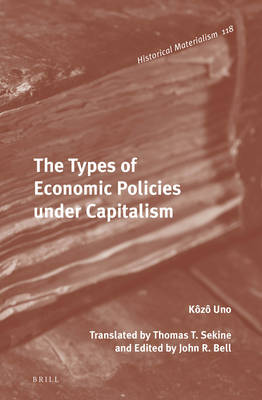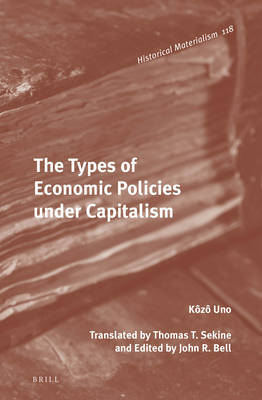
- Afhalen na 1 uur in een winkel met voorraad
- Gratis thuislevering in België vanaf € 30
- Ruim aanbod met 7 miljoen producten
- Afhalen na 1 uur in een winkel met voorraad
- Gratis thuislevering in België vanaf € 30
- Ruim aanbod met 7 miljoen producten
Zoeken
Omschrijving
Uno, who proposes to study capitalism at three distinct levels of abstraction, insists that there should be a mid-range theory of its developmental stages (dankaïron) between the pure theory of capital, which must be couched in the form of Hegelian dialectic (genriron), and capitalist histories which must be recounted with full empirical detail. In this book he illustrates how he would himself expose that mid-range theory, by summarising the three types of economic policy that the bourgeois state successively adopted: mercantilism, liberalism and imperialism. He moreover indicates that economics can relate and cross-fertilise with other branches of social science, such as law and politics, only at this level of abstraction, thus achieving an adequate theory of the bourgeois state. Nowhere else is Marx's insight into 'the state as the epitome of bourgeois society' more vividly endorsed than in this book.
First published in Japanese as Keizai-Seisakuron by Kobundo, Ltd. in 1936. The current work is a translation of the enlarged and revised edition of 1971.
First published in Japanese as Keizai-Seisakuron by Kobundo, Ltd. in 1936. The current work is a translation of the enlarged and revised edition of 1971.
Specificaties
Betrokkenen
- Auteur(s):
- Uitgeverij:
Inhoud
- Aantal bladzijden:
- 352
- Taal:
- Engels
- Reeks:
- Reeksnummer:
- nr. 118
Eigenschappen
- Productcode (EAN):
- 9789004235557
- Verschijningsdatum:
- 19/08/2016
- Uitvoering:
- Hardcover
- Formaat:
- Genaaid
- Afmetingen:
- 155 mm x 236 mm
- Gewicht:
- 612 g

Alleen bij Standaard Boekhandel
+ 558 punten op je klantenkaart van Standaard Boekhandel
Beoordelingen
We publiceren alleen reviews die voldoen aan de voorwaarden voor reviews. Bekijk onze voorwaarden voor reviews.








